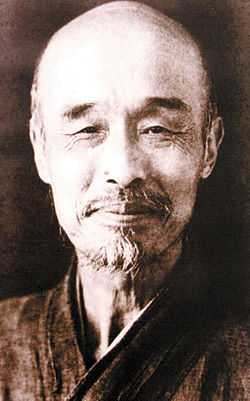Hong Yi

Hong Yi (1880–1942) (Chinese: 弘一大師 Hóngyī Dashi), born Li Shutong (李叔同) was a Chinese Buddhist monk, artist and art teacher. He also went by the names Wen Tao, Guang Hou, and Shu Tong, but was most commonly known by his Buddhist name, Hong Yi. He was a master painter, musician, dramatist, calligrapher, seal cutter, poet, and Buddhist monk.
Life
He was born in Tianjin to a banking family originating in Hongdong County, Shanxi, that migrated to Tianjin in the Ming Dynasty, though his mother was from Pinghu, Zhejiang province. [1]
In 1898 Li moved to Shanghai and joined the "Shanghai Painting and Calligraphy Association", and the "Shanghai Scholarly Society" while he was attending the Nanyang public school. In 1905 Li went to Japan to study at Tokyo School of Fine Art in Ueno Park where he specialized in Western painting and music, and met a lover by the name of Yukiko who was to become his concubine.[2][3] In 1910 Li returned to China and was appointed to Tianjin's Beiyang Advanced Industry School. The next year he was appointed as a music teacher in a girl's school in Shanghai. He went to Hangzhou in 1912 and became a lecturer in the Zhejiang Secondary Normal College (now Hangzhou Normal University). He taught not only Western painting and music but also art history. By 1915 Jiang Qian hired him as a teacher at Nanjing Normal College (renamed in 1949 to Nanjing University), where he taught painting and music. He also taught at Zhejiang Secondary Normal School (浙江兩級師範學堂), the predecessor of the famous Hangzhou High School (浙江省杭州高級中學).
During these later years, Li’s reputation grew, as he became the first Chinese educator to use nude models in his painting classes, not to mention as the first teacher of Western music in China. Some of the students, like Singapore artist Chen Wen Hsi (陳文希)whom he personally groomed, went on to become accomplished masters of the arts in their later days. Li Shutong himself was also an accomplished composer and lyricist. Many of his compositions are still remembered and performed today.
In 1916, Li underwent a 21-day fast at a temple in Hangzhou, and experienced the benefit of a spiritual life. The following year, he took refuge in the Three Jewels of Buddhism. After spending another year there, Li began a new chapter in his life by choosing to be ordained as a monk, and thus began a holistic life dedicated to propagating Buddhism and its code of conduct. After becoming a monk he practised only calligraphy, developing a simple and unadorned, yet unique style, which was treasured by everyone who received a sample. He became known to all as Master Hong Yi. In 1942, Master Hong Yi died peacefully at the age of 63 in Quanzhou, Fujian Province.
Commemorations and Exhibitions
Beijing-based progressive-metal rock band the Tang Dynasty recorded a rock-version of Master Hong Yi's famous romantic ballad, the Farewell song in their second album Epic.[4][5]
A special 130th anniversary celebration of Master Hong Yi showcasing his calligraphy and painting works took place in 2010 in Shanghai, partly sponsored by the Pinghu Municipal Government, and attended by a granddaughter of Hong Yi.[6]
hea==Important works==
- Collections
- Happy Stones
- Li Shutong's Seals
- Articles
- How to Paint 圖畫修得法
- An Introduction to Watercolors 水彩畫法說略
- Lyrics
- Song: Farewell
- Music
- Song: Childhood memories
送别歌 Farewell song
長亭外,古道邊,芳草碧連天, Outside the long pavilion, along the ancient route,[7] fragrant grass green joins the sky,
晚風拂柳笛聲殘,夕陽山外山。 The evening wind caressing willow trees, the sound of the flute piercing the heart,[8] sunset over mountains beyond mountains.
天之涯,地之角,知交半零落, At the brink of the sky, at the corners of the earth, my familiar friends wander in loneliness and far from home,
一瓢濁酒盡余歡,今宵别夢寒。 One more ladle of wine[9] to conclude the little happiness that remains; don't have any sad dreams tonight.[10] tonight.
長亭外,古道邊,芳草碧連天, Outside the long pavilion, along the ancient route, fragrant grass green joins the sky,
问君此去几时来?来时莫徘徊。 I ask of you, as you go this time, when are you to return? When it's time to come please don't hesitate.
天之涯,地之角,知交半零落, At the brink of the sky, at the corners of the earth, familiar friends wander in loneliness and far from home,
人生难得是欢聚,唯有别离多。 In life it is happy reunions that are rare; most often we bid farewell.
天之涯,地之角,知交半零落,
人生难得是欢聚,唯有别离多。
[11]
[12]
See also
| Wikimedia Commons has media related to 李叔同. |
| ||||||||||||||||||||||||||||||||||||||||||||||||||||||||
| |||||
References
- ↑ "平湖市李叔同紀念館——李叔同簡介". Phlst.cn. 2008-08-18. Retrieved 2011-12-18.
- ↑ C.C. Liu (2010) A Critical History of New Music in China. The Chinese University Press, 2010 ISBN 962-996-360-4)
- ↑ Peter Micic (2009-02-15). "Li Shutong and Writing Life's Stories". Animperfectpen.blogspot.com. Retrieved 2011-12-18.
- ↑ "唐朝乐队 送别 现场版". YouTube. 2007-11-01. Retrieved 2011-12-18.
- ↑ "Kaiser Kuo Interview at the Dark Legions Archive black metal and death metal interviews". Anus.com. Retrieved 2011-12-18.
- ↑ "Exhibition of Painting & Calligraphy Works of Li Shutong, Lu Weizhao and Wu Yifeng in Shanghai". English.pinghu.gov.cn. 2010-06-23. Retrieved 2011-12-18.
- ↑ In old times a person would escort his friend several miles in parting. There were pavilions along the routes for travelers to rest.
- ↑ In old times they played flutes to send off a friend. 残 means violent, destructive. Even in the term 残留, "left over," it does not mean waning down, because a violent act proceeded; a destructive act has happened which has resulted in 残留。 What 李 wanted to express was that at the sunset, the sound of flute makes the separation unbearably cruel, almost to the point of being destructively violent.
- ↑ the word 濁, zhou, murky, is only for the sake of the poem's meter
- ↑ 寒 means 孤独凄清 which is a combination of loneliness and being devastatingly poor in either wealth or relationship
- ↑ "李长亭外". baike.com. 2014-01-21. Retrieved 2014-01-21.
- ↑ "李长亭外". fc.5sing.com. 2014-01-21. Retrieved 2014-01-21.
|